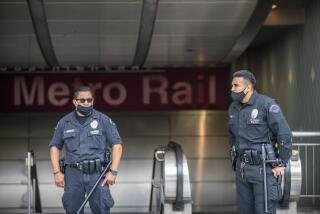MTA Arbitrators Offer Healthcare Proposal
- Share via
Bus and train mechanics who work for the Metropolitan Transportation Authority would receive $4 million in increased contributions toward their healthcare under a plan drafted by a panel of arbitrators.
The transit agency’s earlier proposal to limit healthcare benefits for its roughly 2,000 mechanics and retirees sparked a 35-day strike last fall that crippled the county’s public transportation system. As part of a compromise to settle the strike, both sides agreed to allow arbitrators to help decide the issue of health benefits.
The resulting proposal, which was submitted Tuesday but released Wednesday, gave a little bit to both sides: The union would get a modest increase in benefits, while the transportation agency would limit its financial commitment to retirees.
“It’s kind of a mixed bag,” said Neil Silver, president of the Amalgamated Transit Union, Local 1277, which represented the striking mechanics. “But on the whole, I think we did quite well.”
If the proposal wins the support of union members next week, Silver said the organization’s executive board would also back it. Under the plan, the MTA would contribute $869 a month to a healthcare trust fund on behalf of each active employee by the last year of the three-year contract. That’s about 9% more than the agency had offered before the strike.
In addition, the transit agency would contribute $533 for every retired mechanic under the age of 65, and $179 for each retiree over 65. The money would be used to buy health insurance for union members.
The trust fund, which nearly ran out of money last year amid allegations of mismanagement, would be jointly administered by the union and the MTA. That’s a significant change over past practice, when a board dominated by union appointees oversaw it.
In addition, the arbitration decision written for the three-member panel by retired Judge H. Lee Sarokin said that if the fund runs low again, it would not be the MTA’s responsibility to replenish it, as the agency did last year to the tune of $4.7 million.
Instead, Sarokin wrote, if there’s not enough money, the fund’s administrators would have to either buy lower-cost coverage or demand higher co-payments and deductibles from union members.
The panel’s decision on health benefits can be overturned by a two-thirds vote of either organization’s board of directors. The MTA board is scheduled to discuss it in closed session Monday, and the union membership will vote the same day.









